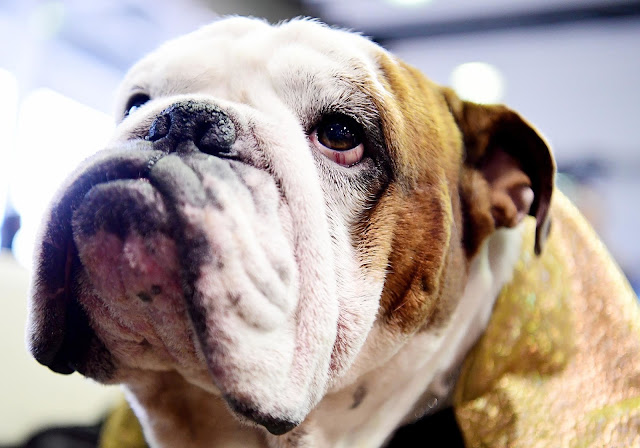A Bulldog dog is one of the greatest options if you want a dog but live in an apartment. So if you decide to get this breed, get to know it better before you buy it. What do you need to know about the bulldog standard?
At first, they were used as fighting dogs, but after the ban on cruel entertainment, the status of bulldogs changed – they became just beloved pets. Popularity came when the dogs moved to France with their owners during the Industrial Revolution.
Bulldog Characteristics
- They are small in height – up to 35 cm.
- Bulldog size conditioned by a massive body and well-developed musculature.
- Bulldog weight up to 8-14 kg.
- Large head with folds, wrinkles, expressive eyes.
- Ears small in size with rounded edges.
- The coat is smooth, straight, short, and soft.
What is the bulldog temperament?
- Puppies are curious and playful, but the older they get, the calmer they are.
- They are happy to play with the owner, but in general, are staid and sedate.
- Very stubborn.
- Intelligent, fairly easy to educate.
- Not aggressive, but will protect the owner.
How do bulldogs get along with adults?
Bulldogs get along well in large families or with only one owner. They sense a person’s mood and know how to adjust to it. The same goes for their leisure time: they can lie quietly nearby or take part in some games.
This breed does not like solitude and quickly becomes sad, but they barely bark or whine. Since they like to be in the center of attention, they gladly accept guests.
How do Bulldogs get along with children?
They easily and quickly find a common language even with small owners, they are happy to spend time with them and protect them. If the bulldog is not in the mood to play, he just goes to his bed without showing any aggression.
But for the first time, be sure to monitor the “communication” between the pet and the child, so that the baby does not accidentally cause any harm to the dog.
How do bulldogs get along with other animals?
Fine, especially if they grew up together. But bulldogs will not be hostile toward a new pet, although they may be jealous at first.
What kind of living conditions do bulldogs need?
First of all, the new member of the family should have his place to rest and sleep. Do not place it where there are drafts, near radiators and doors. Even though adult dogs are minimally active, you need to remember about daily walks outside. It is advisable to walk several times a day for an hour so that the animal can discharge its accumulated energy. But bulldogs do not like fast walking: for example, jogging and high jumping are not for them.
Also, you need to keep in mind their height: they can easily injure their eyes on sharp branches, so you need to be careful when playing in nature. Pay attention, bulldogs do not tolerate the cold, so in winter it is better to buy clothes or minimize the time spent outdoors.
In summer, experts recommend going outside in the morning or late evening, so as not to catch the sun.
What to feed bulldogs?
The easiest solution is food that is specially formulated for bulldogs. Another option is a natural food, but it must include meat and boiled vegetables. Before formulating the diet, it is better to consult a veterinarian, so as not to miss any necessary elements for the dog’s body. It is not recommended that all dogs be fed human food, especially spicy, salty, smoked, pickled, and fatty foods.
Important: No matter what type of food you choose, never overfeed your dog. This particular breed of dog is prone to obesity, so you don’t want to know how big do bulldogs get.
How to care for a bulldog?
- Comb their coats twice a week.
- Bathe at least once every three months.
- Wipe muzzle and body folds with a damp cloth at least once a week.
- There may be secretions in the corners of the eyes and these should be cleaned gently with a soft paper towel.
- Ears should be cleaned several times a month with a special lotion.
- And, of course, you need to cut their nails.
What do bulldogs get ill?
Predominantly this breed of dog is prone to diseases such as:
- Allergies. It can be to food (for example, to birds), household chemicals, cosmetics. There will be inflammation on the skin – contact dermatitis.
- Brachycephalic syndrome – related to the peculiarity of the structure of the dog’s muzzle, manifested as breathing problems and other related symptoms.
- Eye problems – conjunctivitis, third eyelid lacrimal gland prolapse, mechanical trauma.
- Spinal problems – formation of “wedge vertebrae” that usually occurs in adulthood, spinal hernias, and more.
As you can see, this is a dog that could be the perfect pet for any owner. They are small in size, gentle in character, and show little to no aggression. Other animals in the house will not be a problem for the bulldog, and he is also easy to get along with children. All you need to do is create the minimum conditions and take care of their muzzle.

